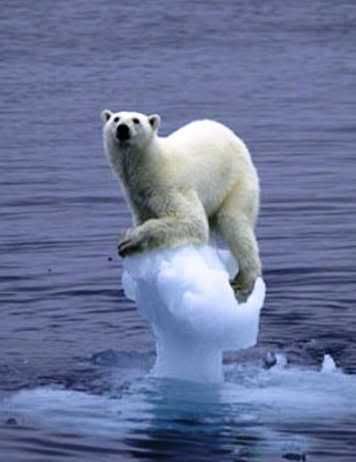( – promoted by buhdydharma )
Crossposted from Antemedius
 For years as the planet warms the arctic icecap has been melting and retreating.
For years as the planet warms the arctic icecap has been melting and retreating.
Many of us have long known that arctic wildlife like polar bears, gray whales, killer whales, narwhals, seals, and arctic fish and bird populations, as well as arctic coastal human settlements, are in danger of eventual extinction as their natural habitat has been retreating, but what most of us haven’t known is the extent and speed of the retreat.
Because of recent ice loss, Arctic surface air temperatures are warmer than normal, and much warmer than scientists expected to find.
As the ice has been melting the growing spans of open water absorb more sunlight than the ice previously did, so as more open water becomes uncovered, the remaining ice will melt more quickly. This will itself accelerate the rate of warming and lead to more ice loss. In addition, global climate change is likely to drive warmer ocean currents into the Arctic region.
You get the picture. What has developed is a positive feedback loop with dramatic implications for the entire Arctic, and for the rest of the planet, and for all life on Earth. It’s been nice knowing you.
The shrinkage of the Arctic ice cap is viewed with much alarm by climate researchers and scientists, as it appears to perturb important ocean currents elsewhere, notably the Gulf Stream, which gives western Europe its balmy climate.
Now a new report by scientists Muyin Wang of the Joint Institute for the Study of Atmosphere and Ocean and James E. Overland of the National Oceanic and Atmospheric Administration’s Pacific Marine Environmental Laboratory, is published in todays edition of the American Geophysical Union’s journal Geophysical Research Letters, forecasting nearly complete icecap loss by 2037:
September 2008 followed 2007 as the second sequential year with an extreme summer Arctic sea ice extent minimum. Although such a sea ice loss was not indicated until much later in the century in the Intergovernmental Panel on Climate Change 4th Assessment Report, many models show an accelerating decline in the summer minimum sea ice extent during the 21st century. Using the observed 2007/2008 September sea ice extents as a starting point, we predict an expected value for a nearly sea ice free Arctic in September by the year 2037. The first quartile of the distribution for the timing of September sea ice loss will be reached by 2028. Our analysis is based on projections from six IPCC models, selected subject to an observational constraints. Uncertainty in the timing of a sea ice free Arctic in September is determined based on both within?model contributions from natural variability and between?model differences.
Received 6 February 2009; accepted 5 March 2009; published 3 April 2009.
Citation: Wang, M., and J. E. Overland (2009), A sea ice free summer Arctic within 30 years?, Geophys. Res. Lett., 36, L07502, doi:10.1029/2009GL037820.
They expect the area covered by summer sea ice to decline from about 2.8 million square miles to 620,000 square miles within 30 years, with frightening implications for both arctic wildlife and the planet. And for humans…
They expect the area covered by summer sea ice to decline from about 2.8 million square miles to 620,000 square miles within 30 years, with frightening implications for both arctic wildlife and the planet. And for humans.

11 comments
Skip to comment form
Author
It’s too late, baby.
Author
dkos
by the end of the century, and its major cities could be in jeopardy, if Americans do not act to slow the advance of global warming, Secretary of Energy Steven Chu said Tuesday.
http://www.latimes.com/news/lo…
in two years, solution.
Blow yer brains out fer Earth Day!
Wars pollute, too. But, naw, we’re too busy engaging in wars than to realize the REAL threat to humanity.
(P.S. OT, but I don’t think you saw this Media List (Very extensive!))
…seeing that terribly alone bear atop it’s tiny mushroom ice cap. Holy forces of nature, forgive us all.